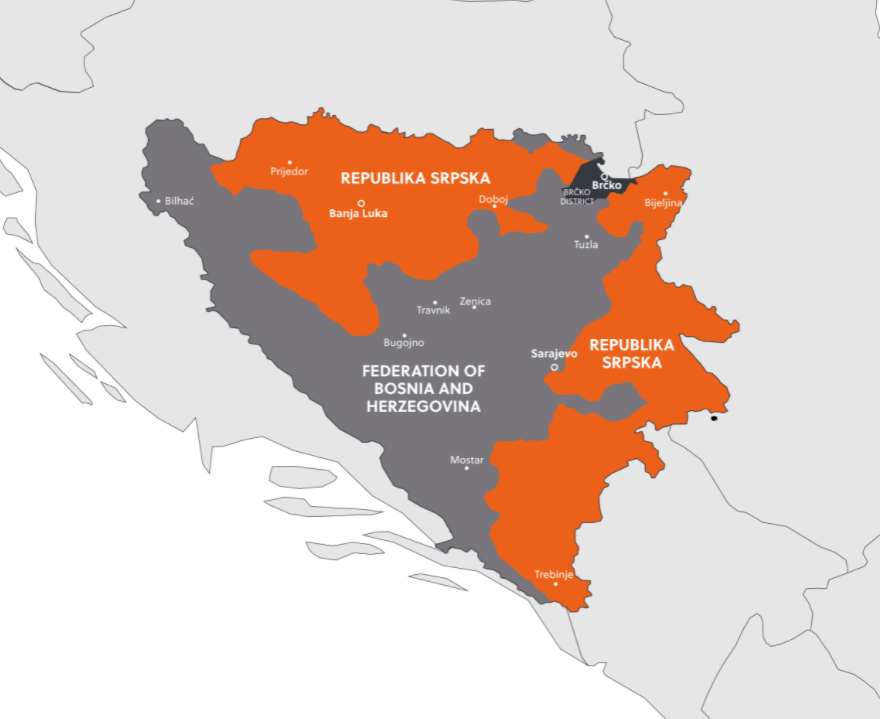Dangerous words: The prospect of renewed conflict in Bosnia and Herzegovina
International observers have denounced recent statements made by Milorad Dodik – Bosnia and Herzegovina’s Serb member of the tripartite presidency – as “tantamount to secession.” In October 2021, Dodik threatened to withdraw from key state institutions, and split Serbs from Bosnia’s multi-ethnic military in violation of the 1995 Dayton Peace Agreement. The High Representative for Bosnia and Herzegovina (BiH), Christian Schmidt, who oversees the implementation of the peace accords, warned that that Dodik‘s actions could dismantle the fragile state system and further stoke tensions.

DODIK’S THREATS
Tensions escalated in July 2021 when the former High Representative, Valentin Inzko, passed several laws penalising the denial of Serbia’s genocide against Bosniak Muslims during the civil war. Many Bosniaks perceived this as an important move. But some Serbians, including Dodik, reject characterising the 1995 Srebrenica massacre as a genocide. Serbian law makers and state employees reacted angrily to the new law, and launched a boycott of BiH’s state institutions. On 27 July, Bosnian Serb political representatives participated in a boycott of the presidency, the Parliamentary Assembly and the Council of Ministers, and other institutions. Meanwhile, the Republika Srpska National Assembly – Republika Srpska unicameral parliament – rejected the law, despite having no legal authority to do so.
In October, Dodik announced that his administration would stop abiding by most of the laws imposed by the High Representative, which include 140 laws aimed at state-building, including in the areas of defence, policing, taxation, and judicial oversight. Dodik claimed that Republika Srpska would create its own army, border police, tax authority and judiciary. He added that Bosnian judiciary, security and intelligence agencies will be banned from operating in Republika Srpska.
Even Bosnian law makers have largely dismissed Dodik’s latest comments as more of the same Serbian nationalist rhetoric, rather than an imminent threat of secession that could drive a civil war.
CAUSE FOR CONCERN?
Dodik’s threats are an unsurprising reaction to the former High Representative’s genocide denial law. For the past 15 years, Dodik has repeatedly called for the secession of the semi-autonomous Republika Srpska in favour of joining Serbia. Dodik’s threats – including the most recent ones – have failed to materialise, and there is no current indication that he intends to pursue the establishment of separate institutions. In fact, in his meeting with Serbian President Aleksandar Vučić in Belgrade on 23 October, Dodik adopted a far more conciliatory tone, claiming that he is unwilling to sacrifice peace in Republika Srpska, and will resume full cooperation with BiH state institutions if an unrelated dispute over the use of forests and agricultural land in the country is resolved. Shortly after this meeting, Serbia pledged additional financial aid for Republika Srpska’s development projects, including education and health infrastructure, in a likely effort to appease Dodik and encourage his commitment to the Dayton Accords.
Even Bosnian law makers have largely dismissed Dodik’s latest comments as more of the same Serbian nationalist rhetoric, rather than an imminent threat of secession that could drive a civil war. The commander of the European Union Force Bosnia and Herzegovina (EUFOR), the EU military deployment in Bosnia and Herzegovina responsible for overseeing the military implementation of the Dayton Agreement, has similarly stated that the potential for clashes in the country is limited. Should Dodik attempt to create separate institutions unilaterally, he will also likely face significant domestic opposition in parliament. Serbian opposition politicians such as Mirko Šarović, president of the largest opposition party in Republika Srpska, have stated that Serbians will not support calls for secession, particularly if it risks renewed conflict and economic collapse.

RUSSIAN SUPPORT FOR DODIK
There is further concern among observers that Russia’s continued interest is undermining western influence in the country, and its tacit support for Dodik could embolden pro-separatist elements in Republika Srpska to move ahead with a breakaway. Russia’s foreign policy efforts – supported by Dodik – have included a push for less EU and UN involvement in Bosnian politics, and calls to dissolve the office of the High Representative, who Russia refuses to recognise due to alleged anti-Serb bias. Such efforts may deepen the current political crisis, but they are unlikely to contribute to a return to conflict. Russia is also not likely to back Dodik militarily, although it will continue to apply political pressure on Western organisations and offer high-level support to Republika Srpska.
MOVING AWAY FROM THE DAYTON AGREEMENT?
The current political crisis will undermine ongoing efforts at state-building and delay Bosnia’s accession to the EU, although this is unlikely to stoke renewed conflict or signal the end of the Dayton Agreement. However, difficult as the Agreement’s implementation will remain in the coming years, it retains the requisite support needed to uphold its implementation. The UN Security Council’s renewal of EUFOR’s mission in early-November highlights this and indicates that the international community remains committed to ensuring peace in the region. This external support, coupled with a lack of domestic appetite for conflict, will maintain the status quo in Bosnia in the coming months, despite Dodik’s occasional pro-secession outbursts.
